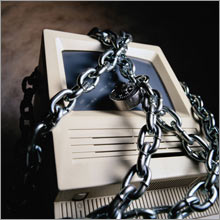Virus-busting made easy - and affordableA simple new means of protecting small-business computers has been designed so even a technophobe can install it.(FSB Magazine) -- Frank Lobascio is on the front line of the battle for safe computing. The president of American Carriers Moving & Storage of Moorestown, N.J., Lobascio used to spend at least $20,000 a year to protect the systems that generate customer estimates, schedule trucks and drivers, send invoices and process payroll for his $3-million- a-year company. Still, viruses, spyware and spam kept creeping onto the network - killing hard drives, destroying data and knocking servers offline. To make matters worse, a handful of staffers were secretly visiting porn and gambling sites on company time. With no room in his budget for a full-time IT person, Lobascio tried to make do by calling in a part-time consultant. "You name the antispyware and antivirus package, and I bought it," he says. Larger companies have been able to keep their networks clean and their employees out of the back alleys of cyberspace with all-in-one devices that combine multiple layers of security capable of screening every byte traveling between the internal network and the Web. However, these unified threat management (UTM) appliances cost several thousand dollars and require a crack IT team to install and manage them properly. Small-business owners who can't afford them have often been forced to take a more piecemeal approach - a spam filter here, an antivirus package there - and hope they can keep up with the frequent updates those technologies require. The small-business solution Now, however, vendors are beginning to offer UTM appliances simple and affordable enough for small-business owners with no IT background. One such gadget, from New Jersey startup TrustELI, is called the ELI (for Electronic Lifestyle Integration) for Small Business. It costs $250, plus a monthly subscription - $20 to $40, depending on the number of users - for updates of the spam, virus and content filters. (A version for home users costs $199, plus $9.99 a month.) The small brushed-metal box, about the size of a hardback book, contains antivirus and antispyware protection, Web-content filtering, e-mail screening a firewall - even VPN (virtual private network) capability, which allows authorized users to make an interception-proof connection to their company network from home, a hotel room or any other remote site. It's relatively easy to set up - you make a few cable connections and then go to TrustELI.com, where you can select one of five preset configurations that cover the most common ways someone might use a computer at home or at work, from Telecommuter to Gaming, and that's it. You've just protected as many as 25 computers. If you want to add more or set up a different level of security for another group of computers, repeat the process with another ELI device. "The setup was fill-in-the-blanks easy," says Lobascio, who installed an ELI for Small Business at the office of American Carriers with no help beyond a little phone support. "I just wrote it down and kept my notes, and now I have exactly what I want coming in and going out." What makes it so simple? ELI for Small Business is a managed network appliance - in other words, it doesn't run on your desktop but on servers at TrustELI's Mount Laurel, N.J., headquarters. In the same way that your cable company tells your set-top box that you've subscribed to HBO but not Showtime, TrustELI's servers tell your ELI for Small Business which security settings you've chosen on the company's Web site. ELI for Small Business automatically "phones home" to TrustELI's servers - at least 30 times a day, the company guarantees - to download the latest updates for its content, spam and virus filters. It also checks whether you've logged on to the TrustELI site to change your security settings and updates them if you have. If its servers don't hear from your ELI device at least once in 24 hours, TrustELI assumes it's broken and ships a new one the next business day. "We wanted to create something easy enough for an entrepreneur to use," says Susan Lutz, TrustELI founder and a longtime network security pro. "You set it and forget it." (It is possible to customize the device further, if you're comfortable geeking out a bit, she adds.) Since he installed his ELI for Small Business in December 2005, Lobascio says, American Carriers has had no trouble with spyware or viruses, and incoming spam has dropped by about 90 percent. Employees are restricted to work-appropriate Web sites, which makes it easier for them to stay focused on the job and helps to keep the network infection-free. Lobascio says he doesn't even have to call his IT consultant as often. "There's a substantial amount of work he's been cut out of," he says. "I'm not a tech guy, I just know what I was dealing with, and I'm not dealing with it now." Does your small business have problems with viruses or spam? Do you have adequate security software? Tell us about it. ---------------------------------- Outgrowing small-business contracts |
Sponsors
|

